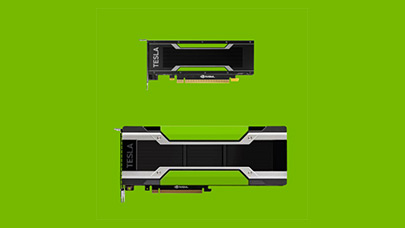
Baidu Brain 7.0 AI Platform Announced; Baidu Kunlun II AI Chips Now in Mass Production
August 18, 2021
The latest version of Baidu’s open AI platform, Baidu Brain 7.0, has been launched by the Chinese technology company, which also announced that its Kunlun II Read more…

AI Is Boosting Server Sales in China
February 6, 2020
Emerging AI workloads are propelling the booming Chinese server market, particularly those hosting programmable co-processors capable of supporting graphics chips used for parallel processing of machine learning tasks. The chief benefactor has been China’s server leader, Inspur. According to datacenter... Read more…

Baidu Embraces Intel Optane for In-Memory Databases
August 29, 2019
Chinese e-commerce giant Baidu is building a new platform based on Intel Corp.’s Optane DC persistent memory as a means of upgrading search engine results del Read more…

Intel Partners with Baidu on Neural Network Training Chip
July 2, 2019
A pillar of Intel’s emerging AI product portfolio, its upcoming Nervana Neural Network Processor for training (NNP-T), will be a collaborative development eff Read more…

Baidu Rolls ‘No Code’ Deep Learning Platform
September 6, 2018
Two software technologies advancing in parallel are merging in a platform designed to use low-code application development to ease development of machine learning models. Baidu, the Chinese e-commerce giant and AI pioneer, unveiled its EZDL "service” platform this week during an industry event in San Francisco, promoting it as a way to build custom machine learning models using a drag-and-drop interface. Read more…

AI in the News: Rao in at Intel, Ng out at Baidu, Nvidia on at Tencent Cloud
March 26, 2017
Just as AI has become the leitmotif of the advanced scale computing market, infusing much of the conversation about HPC in commercial and industrial spheres, it Read more…

HPC Technique Propels Deep Learning at Scale
February 21, 2017
Researchers from Baidu's Silicon Valley AI Lab (SVAIL) have adapted a well-known HPC communication technique to boost the speed and scale of their neural networ Read more…

Nvidia Launches Pascal GPUs for Deep Learning Inferencing
September 12, 2016
Already entrenched in the deep learning community for neural net training, Nvidia wants to secure its place as the go-to chipmaker for datacenter inferencing. At the GPU Technology Conference (GTC) in Beijing Tuesday, Nvidia CEO Jen-Hsun Huang unveiled the latest additions to the Tesla line, Pascal-based P4 and P40 GPU accelerators, as well as new software all aimed at improving performance for inferencing workloads that undergird applications like voice-activated assistants, spam filters, and recommendation engines. Read more…

- Click Here for More Headlines

Whitepaper
Transforming Industrial and Automotive Manufacturing
In this era, expansion in digital infrastructure capacity is inevitable. Parallel to this, climate change consciousness is also rising, making sustainability a mandatory part of the organization’s functioning. As computing workloads such as AI and HPC continue to surge, so does the energy consumption, posing environmental woes. IT departments within organizations have a crucial role in combating this challenge. They can significantly drive sustainable practices by influencing newer technologies and process adoption that aid in mitigating the effects of climate change.
While buying more sustainable IT solutions is an option, partnering with IT solutions providers, such and Lenovo and Intel, who are committed to sustainability and aiding customers in executing sustainability strategies is likely to be more impactful.
Learn how Lenovo and Intel, through their partnership, are strongly positioned to address this need with their innovations driving energy efficiency and environmental stewardship.
Download Now
Sponsored by Lenovo
Whitepaper
How Direct Liquid Cooling Improves Data Center Energy Efficiency
Data centers are experiencing increasing power consumption, space constraints and cooling demands due to the unprecedented computing power required by today’s chips and servers. HVAC cooling systems consume approximately 40% of a data center’s electricity. These systems traditionally use air conditioning, air handling and fans to cool the data center facility and IT equipment, ultimately resulting in high energy consumption and high carbon emissions. Data centers are moving to direct liquid cooled (DLC) systems to improve cooling efficiency thus lowering their PUE, operating expenses (OPEX) and carbon footprint.
This paper describes how CoolIT Systems (CoolIT) meets the need for improved energy efficiency in data centers and includes case studies that show how CoolIT’s DLC solutions improve energy efficiency, increase rack density, lower OPEX, and enable sustainability programs. CoolIT is the global market and innovation leader in scalable DLC solutions for the world’s most demanding computing environments. CoolIT’s end-to-end solutions meet the rising demand in cooling and the rising demand for energy efficiency.
Download Now
Sponsored by CoolIT
Advanced Scale Career Development & Workforce Enhancement Center
Featured Advanced Scale Jobs:
HPCwire Resource Library
HPCwire Product Showcase
© 2024 HPCwire. All Rights Reserved. A Tabor Communications Publication
HPCwire is a registered trademark of Tabor Communications, Inc. Use of this site is governed by our Terms of Use and Privacy Policy.
Reproduction in whole or in part in any form or medium without express written permission of Tabor Communications, Inc. is prohibited.
























